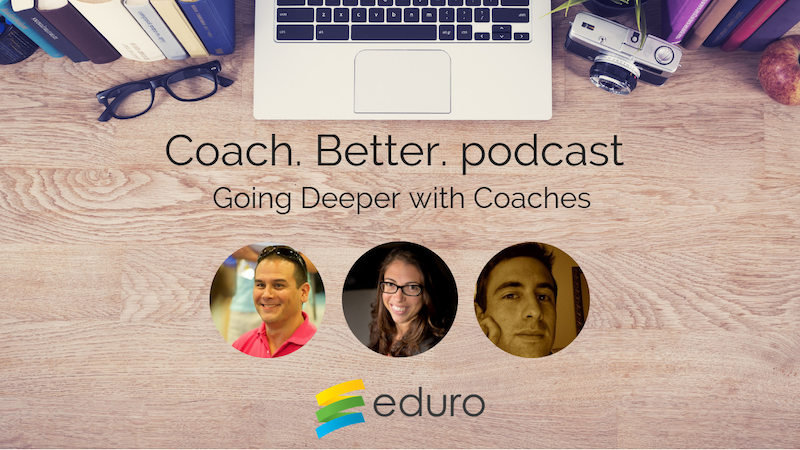Going Deeper with Coaches with Will Kirkwood
Bonus: Watch the video of this episode on YouTube!
Show Notes
Will shares his thoughts on how to reposition his role as a tech coach “from having cool experiences and fixing things, to engaging in conversations about improving student learning”. He also gives us a wealth of advice and strategies for how to collect and use data to see the impact coaching has on student learning. This interview is a gold mine of how to build a successful coaching culture from start to finish, you’re going to love it!
Building Rapport in your teaching community, what are your routines (walking the hall, eating lunch in the staff room) “The Coaching Bank” – how do you make connections with colleagues on a professional level, not just a personal one?
Different over the years, returning to a classroom teaching role before transitioning to tech in both schools, helps build credibility & connections with teachers.
Now using Ewan McIntosh’s model of “What menu of services does my department provide?” As a department, we identify who we connect with personally, and then divide up the faculty that way (pulled from Jim Knight “coalition of the willing” and Diane Sweeny). Then move from personal to professional. This has allowed the role of technicians to change into something more academic. Leveraging personal relationships to professional. Refocus department position. Evolved over time, to focus on “stretch goals”, targeting the people that they weren’t reaching at first glance/effort. Word of mouth is helping it spread. Shifting to a longer time mindset – seeing people’s growth over time.
Eat lunch in the cafeteria, run lessons for people to build up “brownie points”. Daily “milk rounds”: every morning they walk around the school and chat with people in their space. People are feeling more supported because they’re regularly around their room so they can just say it rather than having to come and ask for support.
Redefining how to support student learning, his students are the faculty.
Building a Culture of Coaching: Where/How do you start? Being an advocate for the importance of your role?
Think about it as a long-term role. More ad hoc and moving with the flow of things. Move away from the traditional role of thinking about my job as being providing cool experiences and fixing stuff and towards having engaging conversations with professionals about enhancing student learning in the classroom. Repositioning his own role, mentally. How do we empower faculty and staff to take some skills on as their own (like troubleshooting and problem solving, for example, Google Certified teachers). Baseline skills of all teachers has improved, and mindset has become more proactive, teachers feel more confident they can do things. It’s become part of the culture for teachers to ask each other for support.
Will is on the leadership team at this campus, allows him to be part of the conversations about how they build a coaching culture from the start.
Started as a personal professional interest, with Cognitive Coaching at NIST and School Reform Initiative and CFG groups. Hardest part was repositioning yourself in the eyes of faculty. Ensuring that he fills the needs of the teachers working with students first, as well as trying to reposition the role, is a fine balance. As a team, reflecting on that growth, has helped close that gap.
Staying motivated as a coach when you’re “the only one” who cares about tech-rich learning.
Part of the process of seeing it more long term, and seeing the growth of the role as more long term. For example, how do you get digital citizenship embedded, particularly the “soft skills” when people are planning units so that people have collective responsibility for it.
Helps him to stay motivated when he sees small gains. Getting all the tech coaches on the same page about what they believe, getting all the librarians on the same page. Celebrating the small gains. Break down goals. Using each experience as a learning moment to change over time.
The challenge of being “understood” as a coach – teachers don’t know what you do/think you just have free time.
As the role has evolved, this has become more challenging. Used to be much more visible in what he did as an ICT Integrator, for example. Number of lessons that he runs to support tech in classrooms has decreased because it’s more about teaching and learning. He wonders if teacher’s wonder what he’s doing during the day.
Tries to be very transparent about what he’s doing. Let’s people know who he’s working with and what he’s working on (eg: setting up blogs). So many of those things are usually in the background.
Surveys faculty a couple of times a year to see if people feel supported. With the relationship model, connections are very different than they used to be. Much more opportunity for informal conversations about professional learning, able to make deeper connections.
The many hats of coaching: coach, consultant, co-teacher, etc
Coaching, Planning, Co-Teaching, Administrative / Departmental stuff (setting up backend systems to enable teaching and learning). Has come to the realization that the departmental stuff has to happen to be able to make the rest of his job work. Vision for technology learning, as part of Lower School Leadership Team & School wide EdTech team.
Moves between stages, and tracks them over time to see how much time he spends in each one.
Tech Dept Goals: User Independence, Developing Smoother Systems, Fostering Relationships.
What does data look like from coaching? What are you using to help motivate teachers to make improvements/changes? Assessing tech & tech integration, how do you give it value (teacher evaluation, teacher growth): “More Than Ticking the Box”
Within Dept
Track relationships, level of tech comfort, and level of tech integration.
2 surveys (mid-year, end of year) to get feedback on level of support provided.
As a Coach
Uses Diane Sweeny’s model of Student Centered Coaching.
Work towards setting a student centered goal, and work towards achieving it. Develop assessments to help identify if we’re meeting the goal.
Tech is usually not the number one goal – and this allows Will to bring in tech
Use resources to help students track their learning over time, usually using tech.
As a school
Track tech usage across the school IRC (International Research Collaborative)
Students track their perception of how they use technology, and teachers track their perception of students use – and then they compare to see if perceptions match reality
Focus: how do we know technology is improving student learning, comes back to celebrating those small gains. This involves tech as a supporting thing to track over time, and not the focus of the actual tracking.
What are ways that you make yourself invaluable as a coach? What are the things that teachers love that you do?
Answering with empathy and connecting on a personal level when being asked questions.
Ensuring that he’s there and listening with empathy. Following school norms that run meetings: making room (different ideas can come in), stepping up (to the challenge), seek wisdom (if I don’t know something – being human in the tech side of things). Making sure he’s mentally present during planning meetings, not carrying an agenda, there to improve student learning, if something tech comes up great, but that’s not his goal at those meetings.
Help people see that the role is there to support them and support students, not just making things run tech-wise. He carries tech lens, but he’s a teacher first. Also getting students and teachers to see that technicians are not just the “fix it” person, they can facilitate lessons too. The whole team is there to support student learning.
Where do coaches fail? And what can we do about it?
Bridging the gap between perception & reality of faculty understanding and the role itself, and expecting faculty members to see the work that you’re doing even though you’re not present all the time. It’s not overnight. Can work towards this by being transparent with what you do and being really explicit and sticking to your word.
Failing to realize the importance of allowing time for talking about systems and making sure they’re running properly/flawlessly in the background. To acknowledge that the technical aspect has a lot to do with success of teacher perception of how technology works in the classroom. We have to make time for this, because if they’re not working, it’s hard to have the other discussions.
Important to have support from administration – doesn’t have to be your direct boss. Having someone to have bounce ideas off, beneficial to for this person to be in a higher position of responsibility to you.
Realizing the change to a coaching stance is going to take time, start small and take the time to see the growth that’s happening, celebrate it and share it and more people will come along.
Tips for getting started as a coach in a new school
If your school is at the very beginning: eek out 10 – 20% of your time to have those deeper conversations, and start repositioning your role with them, and then reframe those small discussions, hopefully, word of mouth will spread.
If you do have administrative support: get to know how it could fit into existing structures. How can you use faculty meeting time to talk about supporting student learning with tech. Building coaching concepts into the living structures of the school. Alongside having those coaching conversations. Over time, the combo of both of these will allow leadership to see how coaching is supporting/improving student learning.
If you already have support structures in place: read Jim Knight or Diane Sweeney’s books – student-centered coaching is about the learning (not about the teaching practice), attend a conference on student-centered coaching.
What’s one resource you would recommend and why was it impactful for your practice?
Student-Centered Coaching, Diane Sweeny.
High Impact Instruction by Jim Knight (tons of great strategies, research-based practice – allows people to use the same base-strategies, so we’re all talking the same language
Instructional Coaching by Jim Knight.
Better Conversations – the importance of how you interact with people on a human level – every conversation for both parties should be “life-giving”, people are equal partners.
Daring Greatly Brene Brown – admitting vulnerability & seeking wisdom, in order to move forward you do have to be vulnerable (not necessarily publicly), finding a network that you can share your ups and downs with and learn with.
Who is your network that you’re drawing from? Who are you willing to go on journey with?
JOIN OUR MAILING LIST
Sign up for our #coachbetter mailing list to receive a newsletter every other week all about coaching in a school context. Each FREE newsletter features one of our relevant coaching videos, a practical coaching tip you can use right away, plus a great resource created or selected by the Eduro Team to help you #coachbetter!
CLICK HERE
#COACHBETTER ON FACEBOOK
Connect with other coaches, just like you, in our free #coachbetter Facebook group:
CLICK HERE
EVEN MORE COACHING RESOURCES
See all of our Eduro Learning coaching resources!
CLICK HERE
If there’s something you’re interested in, and we don’t have it, let us know!
PRIVATE MENTORING
Or if you want to see what the private mentorship experience is like, check out our Private Coaching sessions – and get your first coaching session for free – here:
CLICK HERE
ABOUT #COACHBETTER
We’re passionate about the impact instructional coaching can have on school culture, student learning and teacher professional growth. This podcast allows us to share inspiring ideas about coaching through conversations with innovative educators from around the world. Let us help you #coachbetter! We would love to hear your thoughts, ideas and questions so please drop us a comment below!
The Coach Certificate & Mentorship Program
An academic year of professional learning designed by coaches, for coaches!Do you want to feel more confident and inspired in your role as a coach?
We love sharing great content!
Get authentic, relevant, practical content delivered right to your inbox!
Connect with Us







